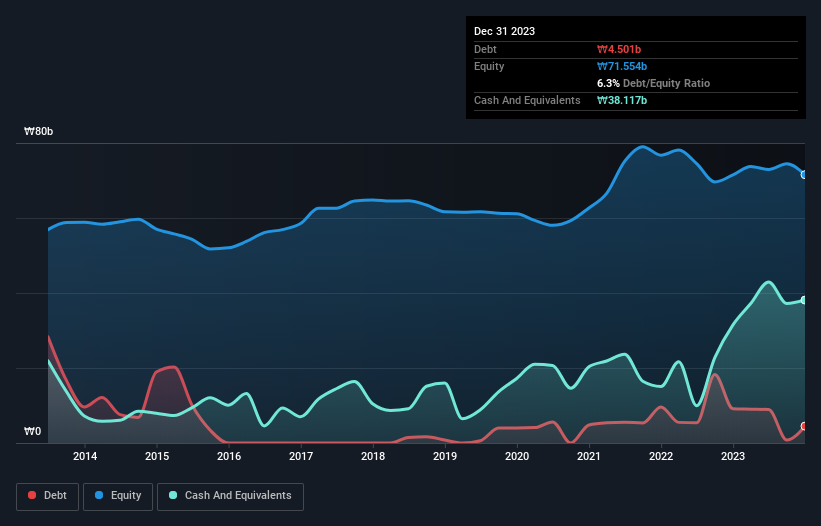- South Korea
- /
- Metals and Mining
- /
- KOSDAQ:A048470
Daedong Steel (KOSDAQ:048470) Has Debt But No Earnings; Should You Worry?
Howard Marks put it nicely when he said that, rather than worrying about share price volatility, 'The possibility of permanent loss is the risk I worry about... and every practical investor I know worries about.' When we think about how risky a company is, we always like to look at its use of debt, since debt overload can lead to ruin. As with many other companies Daedong Steel Co., Ltd. (KOSDAQ:048470) makes use of debt. But the real question is whether this debt is making the company risky.
When Is Debt Dangerous?
Debt is a tool to help businesses grow, but if a business is incapable of paying off its lenders, then it exists at their mercy. Ultimately, if the company can't fulfill its legal obligations to repay debt, shareholders could walk away with nothing. While that is not too common, we often do see indebted companies permanently diluting shareholders because lenders force them to raise capital at a distressed price. By replacing dilution, though, debt can be an extremely good tool for businesses that need capital to invest in growth at high rates of return. The first step when considering a company's debt levels is to consider its cash and debt together.
Check out our latest analysis for Daedong Steel
What Is Daedong Steel's Debt?
As you can see below, Daedong Steel had ₩4.50b of debt at December 2023, down from ₩9.15b a year prior. However, it does have ₩38.1b in cash offsetting this, leading to net cash of ₩33.6b.

A Look At Daedong Steel's Liabilities
Zooming in on the latest balance sheet data, we can see that Daedong Steel had liabilities of ₩19.2b due within 12 months and liabilities of ₩4.60b due beyond that. Offsetting these obligations, it had cash of ₩38.1b as well as receivables valued at ₩27.0b due within 12 months. So it can boast ₩41.3b more liquid assets than total liabilities.
This surplus liquidity suggests that Daedong Steel's balance sheet could take a hit just as well as Homer Simpson's head can take a punch. Having regard to this fact, we think its balance sheet is as strong as an ox. Simply put, the fact that Daedong Steel has more cash than debt is arguably a good indication that it can manage its debt safely. There's no doubt that we learn most about debt from the balance sheet. But you can't view debt in total isolation; since Daedong Steel will need earnings to service that debt. So when considering debt, it's definitely worth looking at the earnings trend. Click here for an interactive snapshot.
In the last year Daedong Steel had a loss before interest and tax, and actually shrunk its revenue by 25%, to ₩138b. That makes us nervous, to say the least.
So How Risky Is Daedong Steel?
Although Daedong Steel had an earnings before interest and tax (EBIT) loss over the last twelve months, it generated positive free cash flow of ₩1.3b. So taking that on face value, and considering the net cash situation, we don't think that the stock is too risky in the near term. The next few years will be important as the business matures. There's no doubt that we learn most about debt from the balance sheet. But ultimately, every company can contain risks that exist outside of the balance sheet. For instance, we've identified 3 warning signs for Daedong Steel (1 can't be ignored) you should be aware of.
At the end of the day, it's often better to focus on companies that are free from net debt. You can access our special list of such companies (all with a track record of profit growth). It's free.
New: Manage All Your Stock Portfolios in One Place
We've created the ultimate portfolio companion for stock investors, and it's free.
• Connect an unlimited number of Portfolios and see your total in one currency
• Be alerted to new Warning Signs or Risks via email or mobile
• Track the Fair Value of your stocks
Have feedback on this article? Concerned about the content? Get in touch with us directly. Alternatively, email editorial-team (at) simplywallst.com.
This article by Simply Wall St is general in nature. We provide commentary based on historical data and analyst forecasts only using an unbiased methodology and our articles are not intended to be financial advice. It does not constitute a recommendation to buy or sell any stock, and does not take account of your objectives, or your financial situation. We aim to bring you long-term focused analysis driven by fundamental data. Note that our analysis may not factor in the latest price-sensitive company announcements or qualitative material. Simply Wall St has no position in any stocks mentioned.
About KOSDAQ:A048470
Acceptable track record with mediocre balance sheet.
Market Insights
Community Narratives



